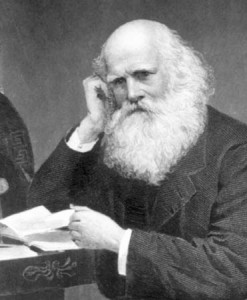 Born in 1794 in Massachusetts, William Cullen Bryant served as editor for the New York Evening Post for much of his life and was one of the most popular of the romantic poets to come out of America in the 19th Century. His celebrity was a rival to both Longfellow and Emerson whilst he was still in his youth.
Born in 1794 in Massachusetts, William Cullen Bryant served as editor for the New York Evening Post for much of his life and was one of the most popular of the romantic poets to come out of America in the 19th Century. His celebrity was a rival to both Longfellow and Emerson whilst he was still in his youth.
He was brought up in the isolated social environment of a small town called Cummington where his father, a surgeon, tried to prosper but largely failed. School was strict but as a child he was exposed to the wide variety of nature, something that helped develop his romantic sense of life when he began to write poetry. He was also exposed to his grandfather’s deeply religious Calvinist views which placed a stress on philosophical issues such as death and the devil.
When he left school, Bryant studied law and joined the bar in 1815 at the age of 21. He was already writing poetry at the time, encouraged by his father in his youth. He had written The Embargo when he was 13, a political satire of the shipping embargo at the time and supported by Thomas Jefferson. In 1811 he published perhaps his most well-known work in Thanatopsis.
The critical reception for the poem may well have been down to Bryant’s age just as much as the content which was in essence a meditation on death. It went on to become one of the popular poems of the 19th Century with many school children knowing it off by heart as they were taught to recite it in the classroom.

He published his poetry on a regular basis after the success of Thanatopsis, including a bold and epic story of the creation of the United States in The Ages. When he married in 1821, Bryant realized that writing poetry couldn’t sustain his new family so he embarked on the career he had trained for, as a lawyer working in Great Barrington. It wasn’t long though before he was in New York and became editor of the New York Review and then the Evening Post. He would remain in that post for the best part of the next 50 years, becoming involved in the politics of the city, particularly supporting the far reaching reforms of the Republican Party.
In 1832 he published an edition of Poems, a collection of all his verses from the previous decade which set him apart as one of the prominent voices in literature at the time. In 1834 he published his blank verse work The Prairies that became synonymous with the expansion of the American West and the pioneer spirit.
In later life, Bryant moved away from writing his own poetry to producing translations of classic works such as The Iliad and The Odyssey. He was also a critic of Lincoln after the Civil War because he didn’t immediately emancipate those still in slavery. At times he traveled widely in Europe and became an authority on all aspects of homeopathy.

In 1878 he fell in an accident during a celebration in Central Park and suffered complications from his injuries. He died shortly afterwards at the age of 83 and was buried on Long Island.

